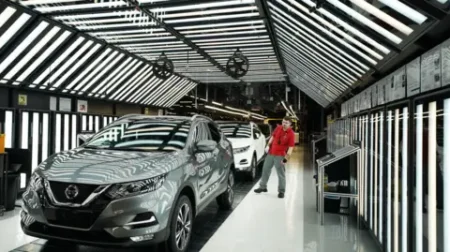**Lotus Cars Announces No Factory Closures Amid Expansion Considerations**
In a recent development, renowned sports car manufacturer Lotus Cars has officially stated that it has “no plans” to shut down any of its factories. This announcement comes in the wake of reports suggesting that the company was exploring the possibility of establishing a new production facility in the United States. The information was initially covered by the Financial Times, highlighting the precarious situation that could potentially put approximately 1,300 jobs at risk at its headquarters in Hethel, Norfolk.
The statement released by Lotus on X (formerly Twitter) underlined the brand’s commitment to maintaining normal operations at all factories while simultaneously exploring global market opportunities. The statement’s reassurance arrives during a period of speculation regarding the company’s future production strategies and its geographical manufacturing footprint.
This news reflects broader trends within the automotive industry, especially as many companies reassess their production locations in response to changing market demands and external economic pressures, such as tariffs affecting imports. It is understood that the UK’s Secretary of State for Business and Trade, Jonathan Reynolds, has been engaged in discussions to address the concerns stemming from the potential changes at Lotus.
The car maker had temporarily halted production at its Hethel plant due to complications related to newly imposed tariffs on vehicle imports into the United States, which have increased to a daunting 25%. This tariff is a significant hurdle as America represents a key market for Lotus. Such challenges intensify as the company wheels through discussions about the future trajectory of its production capabilities amid fluctuating economic climates.
Lotus Cars has been part of the automotive landscape for decades, known for its lightweight sports cars that combine performance and agility. The firm’s recent troubles reflect a broader pattern resonating through the auto industry, particularly as manufacturers pivot to electric vehicle (EV) production and navigate increasingly stringent regulations and market expectations.
Reinforcing its loyalty to the UK, Lotus’s official remarks included a commitment to its customers, employees, dealers, suppliers, and its rich British heritage. This is crucial as the firm continues to handle talk of production shifts, reminding stakeholders of its dedication to its established roots even while exploring potential expansion avenues abroad.
While some media outlets have speculated about the viability of shifting production to the US, sources within Lotus indicate that the general perspective is still under review. It is critical for Lotus to strike a balance between its historical legacy in the UK and the real-time demands of the global automotive marketplace.
Moving forward, as the automotive industry continues to adapt to rapidly changing landscapes, the response to external pressures will be pivotal in determining how Lotus balances its interests between domestic stability and international reach. It remains to be seen how the discussions led by Jonathan Reynolds will influence the company’s direction moving forward, as stakeholders closely watch Lotus’s next moves in defining its future.
As for enthusiasts and followers, the unfolding situation offers a glimpse into how storied brands like Lotus are navigating contemporary challenges while striving to innovate and maintain their legacy. The blend of nostalgia for the past with forward-thinking strategies will undoubtedly play a role in shaping the narrative surrounding this iconic brand in the months and years ahead.











